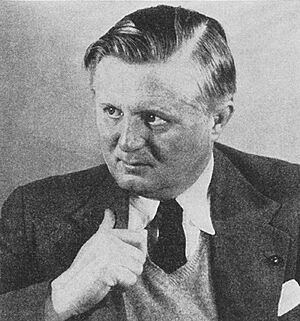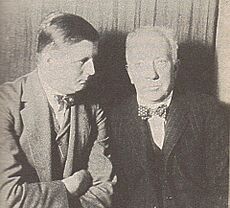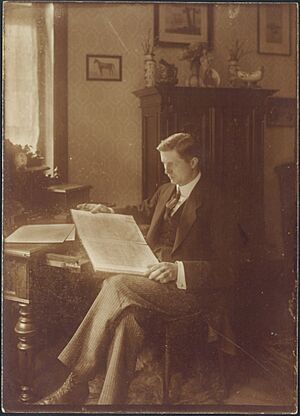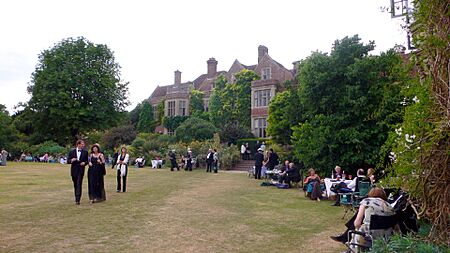Fritz Busch facts for kids
Quick facts for kids
Fritz Busch
|
|
|---|---|

Busch in the early 1930s
|
|
| Born | 13 March 1890 Siegen, Westphalia
|
| Died | 14 September 1951 (aged 61) London, England
|
| Occupation | Conductor |
Fritz Busch (born March 13, 1890 – died September 14, 1951) was a famous German conductor. He was known for his careful and honest approach to music.
Busch grew up in a musical family in Siegen, Germany. He studied music at the Cologne Conservatory. After serving in the First World War, he became a top conductor at two major German opera houses. He worked at the Stuttgart Opera from 1918 to 1922. Then, he moved to the Dresden State Opera from 1922 to 1933. There, he helped premiere new operas by famous composers like Richard Strauss and Paul Hindemith. He also conducted at important music events like the Bayreuth and Salzburg Festivals.
Fritz Busch strongly disagreed with the Nazis. Because of this, he lost his job in Dresden in 1933. He then spent most of his career conducting outside Germany. He worked in New York and London. His main workplaces were the Teatro Colón in Buenos Aires, Argentina, and with orchestras in Copenhagen and Stockholm. He also helped start the Glyndebourne Festival Opera in England, where he was the first music director. He worked closely with stage director Carl Ebert. Busch passed away in London when he was 61 years old.
Contents
Fritz Busch's Early Life & Training
Growing Up in a Musical Family
Fritz Busch was born on March 13, 1890, in Siegen, Germany. He was the oldest of eight children. His father, Wilhelm Busch, was a carpenter and made violins. His mother, Henriette, was an embroiderer.
Music was a big part of their family. His parents often played dance music on weekends to earn extra money. Fritz's brothers also became famous musicians: Adolf Busch was a violinist, Hermann Busch was a cellist, and Heinrich Busch was a pianist and composer.
Studying Music at Cologne
As a boy, Fritz learned music from his father and other teachers. In 1906, he went to the Cologne Conservatory, a famous music school. There, he studied:
- Harmony and counterpoint (how music is put together)
- Piano
- Conducting (leading an orchestra)
His conducting teacher, Fritz Steinbach, was very important to him. Steinbach was known for conducting music by Beethoven and Brahms.
First Conducting Jobs
In 1909, Busch worked as a conductor at the Deutsches Theater, Riga. He also toured as a pianist in 1911 and 1912.
Later, he became the music director for the city of Aachen. This meant he was in charge of the Municipal Opera and the city's choir. He premiered new works by composers like Donald Tovey. In 1911, Busch married Margarete Boettcher. Their first son, Hans, was born in 1914 and later became a stage director.
Busch stayed in Aachen until 1914, when the First World War began. He joined the German army and became an officer.
Leading Opera Houses in Germany
Modernizing the Stuttgart Opera
In 1918, after the war, Busch became the music director of the Stuttgart Opera. This opera house had a very traditional style. However, after the German Revolution of 1918–1919, things changed.
Busch used this new freedom to bring in many new works. He introduced operas by Paul Hindemith and Hans Pfitzner. He also put on modern productions, like Adolphe Appia's staging for Wagner's Ring operas.
Success at the Dresden State Opera
In 1922, Busch was chosen to be the music director of the Dresden State Opera. This was a very important job because Dresden was one of Germany's most famous opera houses.
Under Fritz Busch, Dresden continued to be a leading opera house. He helped premiere several new operas by Richard Strauss, including Intermezzo (1924) and Die ägyptische Helena (1928). He also premiered works by Ferruccio Busoni and Kurt Weill. He brought the German premiere of Puccini's Turandot to Dresden. For eleven years, he kept the Dresden opera at a very high level. He used new and exciting designs for costumes and sets.
In 1924, Busch conducted at the Bayreuth Festival for the first time after the war. However, he didn't like the experience and refused to conduct there again.
Busch's American Debut
In 1927, Busch made his first appearance in America. He conducted the New York Symphony Orchestra. A highlight of the concert was nine-year-old Yehudi Menuhin playing the Beethoven Violin Concerto. Busch was so impressed that he invited Menuhin to Dresden. There, Menuhin played concertos by Beethoven, Bach, and Brahms.

In 1932, Busch was asked to conduct Mozart's Die Entführung aus dem Serail at the Salzburg Festival. He agreed, but only if Carl Ebert could direct the production. Their work together was a big success. This led Ebert to invite Busch to Berlin to conduct Verdi's Un ballo in maschera.
Leaving Germany Due to the Nazis
Fritz Busch was not interested in politics, but he was very upset by the rise of the Nazi Party. He had many Jewish friends and believed in democracy, not dictatorship. He openly showed his dislike for the Nazis.
After Adolf Hitler came to power in 1933, Busch was forced to leave his job in Dresden. This upset many people, including Richard Strauss, who had dedicated his new opera Arabella to Busch. Busch was replaced by Karl Böhm, who was more acceptable to the Nazi government.
Some high-ranking Nazis, like Hermann Göring, actually admired Busch and wanted him to lead the Staatsoper. However, Wilhelm Furtwängler, another famous conductor, didn't want Busch as a rival in Berlin. So, the job went to Clemens Krauss instead. Busch also refused an offer to return to Bayreuth after Arturo Toscanini refused to work under the Nazi government.
New Beginnings Outside Germany
From 1933 onwards, Fritz Busch mostly worked outside Germany. In May 1933, he became the music director of the Teatro Colón in Buenos Aires, Argentina, for a season.
When he returned to Europe later that year, he began a long partnership with the Danish Radio Symphony Orchestra and the Stockholm Philharmonic in Scandinavia.
Founding Glyndebourne Opera
In the early 1930s, an English landowner named John Christie and his wife, singer Audrey Mildmay, had an idea. They wanted to create an opera house on their estate at Glyndebourne in Sussex, England.
In November 1933, Christie asked Busch to be his music director. Busch was already committed to Buenos Aires. However, a financial problem in Argentina allowed him to accept Christie's offer. Just like at Salzburg, he made sure Carl Ebert joined him to direct the productions.
Glyndebourne became a huge success. The opera company performed Mozart operas, as well as Don Pasquale by Donizetti and Verdi's Macbeth. Critics and audiences loved Glyndebourne's shows. Busch and his team also made important early recordings of Mozart's Le nozze di Figaro, Don Giovanni, and Così fan tutte.
Busch remained the music director at Glyndebourne until the Second World War started in 1939. The festival then stopped for a while. In 1938, he made his London debut, conducting the London Symphony Orchestra.
Wartime and Post-War Years
Busch continued to conduct at the Teatro Colón in Buenos Aires from 1934 to 1936 and again from 1940 to 1947. Before 1940, he worked in Scandinavia during the winter. He loved Copenhagen so much that he turned down an offer to become the chief conductor of the New York Philharmonic.
From June 1940 to 1945, he mostly conducted in South America. He also made guest appearances with the New York Philharmonic in 1942. In 1945, he made his debut at the Metropolitan Opera in New York with Lohengrin. He toured with the company for four seasons. However, New York was not his favorite place. One concert promoter said, "he was not a showman."
In 1950, Busch returned to Glyndebourne when the festival started again after the war. In early 1951, he visited Germany, conducting in Cologne and Hamburg. He returned to Glyndebourne later that year for an all-Mozart festival. He conducted Così fan tutte, Figaro, Don Giovanni, and the first professional production in England of Idomeneo. Critics praised his work, saying he made the orchestra and singers sound like "a laughing, glowing entity."
In August 1951, Busch was in Edinburgh to conduct his first post-war Verdi opera, La forza del destino. Critics praised his "inspired" conducting. On September 14, 1951, just five days after his last performance in Edinburgh, Busch suddenly died in London from a heart attack. He was 61 years old.
Busch's Musical Style
Fritz Busch was known as a very reliable German musician. He wasn't flashy or overly dramatic. Instead, he was thorough and strong-minded. He knew exactly what he wanted to achieve in his music. He balanced his high ideals with practical sense.
The Times newspaper called him a "virile, faithful and extremely skilful interpreter of Mozart." They noted that his conducting was calm and authoritative. His performances were full of life, but without any unnecessary fuss. He focused completely on presenting the music as he believed the composer intended it.
Recordings of Fritz Busch
Fritz Busch made many important recordings. Here are some of them:
- 1934–1935: Mozart, The Marriage of Figaro, with the Glyndebourne Festival Opera.
- 1935: Mozart, Così fan tutte, with the Glyndebourne Festival Opera.
- 1936: Mozart, Don Giovanni, with the Glyndebourne Festival Opera.
- 1950: Mozart, Così fan tutte excerpts, with the Glyndebourne Festival Opera.
- 1951: Mozart, Idomeneo excerpts, with the Glyndebourne Festival Opera.
- 1951: Verdi, Un ballo in maschera, in German, Ein Maskenball, with the Cologne Radio Symphony Orchestra.
- 1951: Mozart, Cosi fan tutte Live from Glyndebourne.
See also
 In Spanish: Fritz Busch para niños
In Spanish: Fritz Busch para niños
 | Janet Taylor Pickett |
 | Synthia Saint James |
 | Howardena Pindell |
 | Faith Ringgold |



